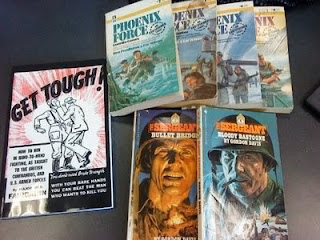The Hunted follows the adventures of Evan Littleton, a Confederate soldier who has spent two years in a Yankee prison camp until the end of the Civil War, at which point he is turned loose and walks all the way back to his home in Texas. Or what used to be his home - he discovers that a lot has changed in the four years since he has been gone, and now Evan must range across much of West Texas in order to find his children and bring them together again.
Trouble seems to rear its head wherever Evan goes, and the former soldier finds himself pitted against the Texas State Police, squatting carpetbaggers, outlaws and bandits, marauding Indians, Mexican renegades - a whole rogue's gallery of ne'er do wells and scoundrels. At the same time, however, Evan also meets and befriends a number of honest, compassionate people who help him in his quest. The story shows you the best and the worst of human nature and how Evan handles both extremes is both entertaining and heart-warming.
While I have seen my fair share of western films, I haven't read many novels. These days, the Western is a mostly forgotten genre (and according to John Locke in his kindle publishing "how to" book, the western is the worst-selling fiction genre on Amazon). But it wasn't too long ago that many of our culture's most profound and engaging stories emanated from westerns fiction. There is something so perfectly archetypal about a Wild West tale that you can't help but be pulled into these stories, and yet, not all of it is fiction; there were gunfighters, marauders, bandits, noble farmers, drunkards and whores, fortunes made and fortunes lost. The Hunted isn't an epic story, but in a way - sure it is! You can see a touch of The Odyssey deep down in there, mixed in with a number of other classic "quest" stories.
As an aside, coming from a background of almost twenty years playing pen-and-paper tabletop role-playing games, I find it curious that while the Wild West is the archetype frontier environment upon which Dungeons and Dragons was built, there have only been a tiny handful of Western-themed role-playing games, and none of them have really been extraordinarily popular. I guess it is a credit to the genre that so many of its themes are, instead, ported to other places - fantasy worlds, science fiction and post-apocalyptic settings - where the themes work just as well.
So if you're looking for a fast, fun, easy read, and you've been intrigued by the western genre but haven't yet dipped your toe, give The Hunted a try.












